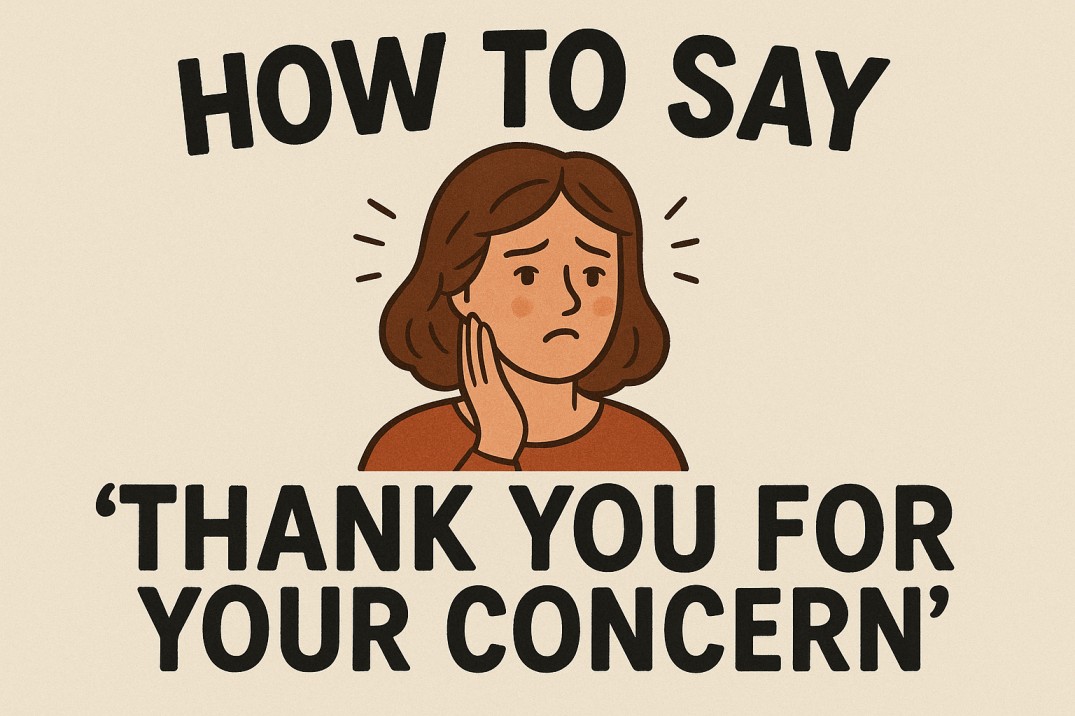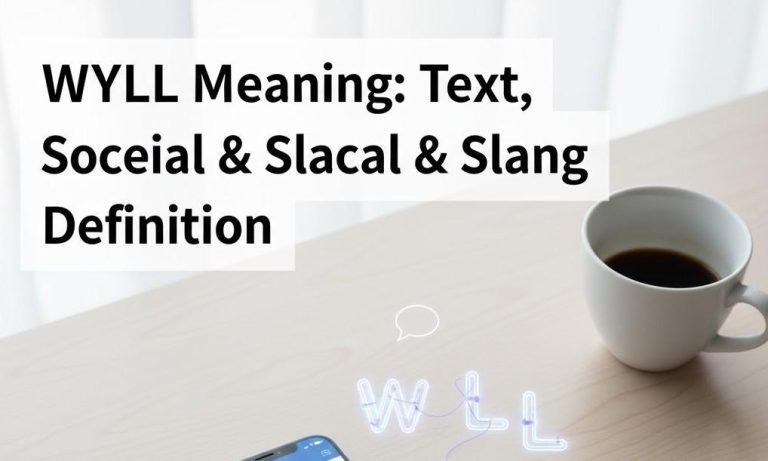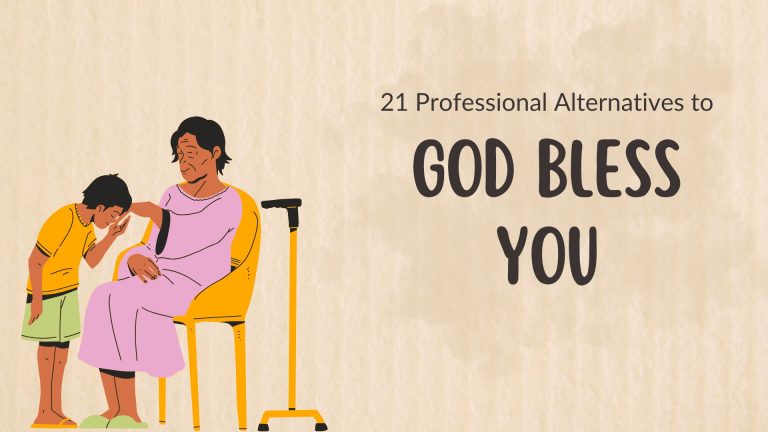How to Say ‘Thank You for Your Concern’ – Examples & Meaning
Ever had someone say, “Thank you for your concern,” and you weren’t quite sure how to take it? Don’t worry—you’re not alone. That simple phrase can mean a lot of things, depending on how it’s said and the situation around it. Sometimes it’s sincere, other times a little guarded. And every now and then? It’s laced with a hint of sarcasm.
Let’s talk about what it really means, when to use it, and how to respond in a way that keeps things respectful—and maybe even kind.
What “Thank You for Your Concern” Really Means
On the surface, “Thank you for your concern” is polite. It’s a way of showing appreciation when someone checks in on you. Maybe you weren’t feeling well. Maybe you were stressed. Maybe something tough was going on in your life. And someone noticed.
That deserves thanks, right?
But here’s the thing. Sometimes, that phrase can also carry a little emotional weight. Depending on tone and timing, it can shift from warm to cool fast. Picture someone saying it with a half-smile and a sharp edge to their voice—suddenly, it feels more like a shutdown than gratitude.
So what does it really mean?
- Literal Gratitude: “I appreciate you noticing and asking.”
- Polite Distance: “I see you care, but I’m not ready to talk about it.”
- A Gentle Dismissal: “Thanks, but let’s not dwell on it.”
- Sarcasm: “I didn’t ask for your opinion, but thanks anyway.”
Context matters. And tone? It says even more.
20 Other Ways to Say “Thank You for Your Concern”
Sometimes, you want to express the same idea but in a slightly different way. Maybe you’re aiming for more warmth—or trying to soften the message.
Here are a few alternatives that fit different moods:
| Alternative Phrase | Tone / Style |
|---|---|
| I truly appreciate your thoughtfulness. | Professional / Formal |
| Thank you for taking the time to check in. | Professional / Formal |
| Your concern means a great deal to me. | Professional / Formal |
| I’m grateful for your attention and support. | Professional / Formal |
| Thank you for your kind consideration. | Professional / Formal |
| It really means a lot that you care. | Warm / Sincere |
| Thanks so much for thinking of me. | Warm / Sincere |
| I appreciate your kindness more than you know. | Warm / Sincere |
| Your support is genuinely appreciated. | Warm / Sincere |
| I’m touched by your concern—thank you. | Warm / Sincere |
| Thanks, that’s really kind of you. | Casual / Friendly |
| I appreciate you checking in! | Casual / Friendly |
| Means a lot—thanks for caring. | Casual / Friendly |
| Thanks for being so thoughtful. | Casual / Friendly |
| You’re the best—thanks for thinking of me. | Casual / Friendly |
| Aw, look at you caring and stuff—thanks! | Playful / Lighthearted |
| Appreciate the concern… I’m still alive, I promise! | Playful / Lighthearted |
| You worry too much, but thanks anyway! | Playful / Lighthearted |
| Thanks—your caring level is off the charts. | Playful / Lighthearted |
| Cheers for the love and good vibes! | Playful / Lighthearted |
If you’re ever in doubt, go for something that feels natural to you. People can usually tell when you’re being real.
When to Use This Phrase in Everyday Situations
“Thank you for your concern” pops up in more places than you might think. It’s one of those phrases that can travel between professional, casual, and even awkward moments. Here are a few common situations where it fits:
1. At Work
Maybe a coworker notices you seem stressed. They ask if everything’s okay. You don’t want to explain the whole story. You reply, “Thank you for your concern—I’ve got it handled.”
It’s polite, but it also signals that you’re keeping things professional.
2. After a Loss or Crisis
Friends and family often reach out when something tough happens—loss of a loved one, illness, job trouble. Saying “Thank you for your concern” can be a calm, composed response, especially when you’re not ready for long talks.
3. In Healthcare Settings
Doctors, nurses, or even colleagues might ask how you’re doing after an illness or injury. A simple “Thank you for your concern” works as a brief, respectful reply.
4. Online Conversations
Sometimes someone reaches out with a DM or comment like, “Hope you’re okay!” A quick “Thanks for your concern” acknowledges them without pulling you into a deep conversation.
But a word of caution: online, tone gets lost fast. So if you mean it sincerely, maybe pair it with an emoji or short follow-up. Just to avoid sounding cold.
Also Read – Guess What? Chicken Butt! – The Origins & Funniest Variations
How to Respond When Someone Says “Thank You for Your Concern”
Alright—so someone has said it to you. Now what?
The best response depends on what they’re trying to say. Here are a few angles to help you read the room and reply with grace:
1. They Mean It Genuinely
If their tone is soft or sincere, you can respond with:
- “Of course—just wanted to check in.”
- “Anytime. Let me know if you need anything.”
- “I’m here if you want to talk.”
Simple and warm wins here. Keep it low-pressure.
2. They’re Setting a Boundary
If it feels like they’re drawing a line, respect it.
- “Totally understand.”
- “No problem. Just wanted you to know I care.”
- “Got it. Take care.”
You don’t need to push. Let them know the door stays open without forcing it.
3. They’re Being Sarcastic
Now, if you suspect a little snark under the surface? Stay cool. Don’t feed the fire.
- “Alright—if you ever want to chat, I’m around.”
- “No worries. Wishing you well.”
Grace under pressure shows maturity. Sometimes, silence really is golden.
Conclusion
“Thank you for your concern” walks a fine line. Sometimes it’s heartfelt, other times distant. Occasionally, it’s a polite way of saying, “Back off.” But in every case, it deserves a moment of thought before you respond.
People express emotions in different ways. Some wear their hearts on their sleeves. Others hide behind politeness. But concern is still care—whether loud or quiet.
So the next time you hear that phrase, take a second. Listen to how it’s said. Feel out the moment. Then, answer with the kind of grace you’d want if the roles were flipped.
Because honestly? A little grace goes a long way.



